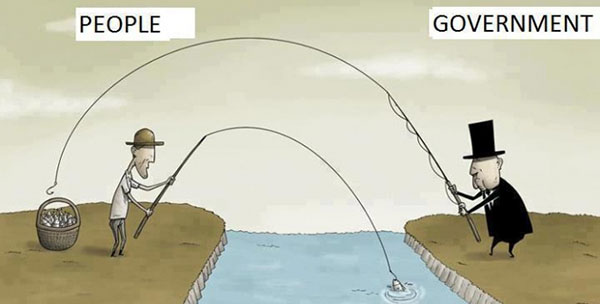Political satire does in various ways alter the political history as it strengthens and accompanies political accomplishments. Political satire aims to inform individuals about matters pertaining to the general public as well as issues interconnected to government and politics, in a lighter but educational manner. It not only acts as a curative means to entertain citizens but also has a substantial effect on the political scene of a country. Based on this, “Political satire in the 21st century has a higher impact on the public opinion than a revealing newspaper article through creating humor and simplicity." The use of satire to express thoughts, themes, and opinions has been in existence since the early ages. The use of satire over centuries as a literary tool has made it possible for essential thoughts, themes, and ideas to be passed across and expose the malfunctions and flaws in the society in a humorous manner. Over time, it has progressed in almost every direction which correlated with the fashionable trends of the contemporary population. As much as some concepts of this political literary tool have not undergone considerable changes, many other aspects defining satire have vanished. The educational concepts and teachings serving as life examples have almost been entirely erased from the broad application of satire. This may be attributed to the swift changes occurring in the society. Nonetheless, political satire still exists and can be seen in the contemporary world on television, newspaper cartoons.
In many administrative systems, political satire was used as an alternative informational tool in lieu of more treacherous disputes. As much as satire may instill changes in the political history, it has frequently been intended to reinforce and accompany a given political action. Although the brunt of this form of satire cannot be accurately determined, it is apparent that, once integrated with other opposing forces, political satire has been discovered to impart noteworthy differences in the political arena as well as in the entire society. Criticism of politics in the contemporary world often comes in satirical overtones that integrate comedic genres with the reality based approaches to representation, such as cinema. Satirical campaigns not only uncover mundane secrets on television, but also serve the public in revealing the limits of democracy in their particular country. The manner in which the democracy behaves with regard to its politics and citizens plays an immense role in the extent to which the media would utilize satire to handle such issues. Indeed, the media categorize their breaking and popular news on air under a big influence from the political views of not only leaders, but also the everyday citizens.
Political satire has achieved a prominent status in the current years and has generated an exertive influence which assists the paper to connect with the readers. In turn, this has enabled to generate political discussions and knowledgeable interaction with its readers, hence serving as a means for community outreach. Political satire has been cherished by both the politicians and the general public, because it is able to unfold the future ahead of them and show the potential of being more open minded, effectual, and cooler. Satire is reflective of true political situation in most governments. Satire is valued for its message potency, particularly while handling political matters that affect the society. There has never been a superior way of articulating the funny side of politics than using satirical cartoons. Many of the people’s views have transformed with the use of cartoons. Those who have kept away from politics because of how serious and engaging it is, have found themselves developing a different perception after coming across the satirical TV shows.
Although not considered satirical, some reality TV shows have incorporated certain aspects of satire in the way they criticize the behavior of the youths. It is universally acknowledged that reality TV shows are staged; the true friendships and relationships are created for the sake of the expected drama to unfold. Sometimes, the idea of reality TV faces opposition due to its implications for morality. Most of the individuals who feel offended by the content of reality TV tend to use morality as an excuse and weapon against them. Nonetheless, reality shows that employ the services of young adults in their middle ages as their central characters deliver the themes and messages affecting this age particular group. Bearing that in mind, the satirical element is either deliberately or inadvertently integrated into such TV shows and, indeed, does criticize some of the ridiculous behaviors of the youth. The utilization of satire is directed towards criticizing societal flaws, and this may be achieved in reality shows through characters’ actions. Since many reality TV shows are stage managed, it may be concluded that their satirical content is specifically targeted at the social flaws that the human population has amassed over time. As a result, they do not quite generalize to the actual situations in the society, as they are essentially meant to produce a sufficiently thrilling and truthful drama. The bottom line is extracting profit from such shows, rather than criticizing misdeeds in the society.
Television is mostly used for relaxation, and not for educational or scientific reasons. An average individual puts a lot of effort so as to identify human flaws and understand the power struggles, viciousness, or the absurd intelligence satirized in television shows, which fairly well depict the bizarre activities, which governments and politicians engage in. Political cartoons play a crucial role in branding the image of political parties and leaders, thus affecting the decision of the voters. In newspapers, political cartoons are published to highlight a specific idea or view point through illustrations. In most cases, the images are exaggerated in order to be humorous and informative simultaneously. At times, the political cartoons can have serious or satirical tones depending on the artist, the audience, and the idea being passed across. Political cartoons have maintained the culture of provoking, educating, and informing the viewers on current issues.

